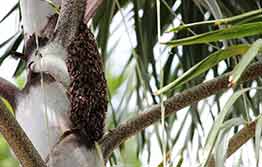Varroa mite update
Here’s the February 2017 update from the National Varroa Mite Eradication Program team in Townsville.
 Bees on the move
Bees on the move
With the recent rainfall in North Queensland, there has been a notable increase in bee activity and swarms.
The National Varroa Mite Eradication Progam is calling on beekeepers and members of the public in the Townsville area to report new bee swarms and feral nests so that they can be examined for the presence of varroa mite.
If you see any swarms, or feral bee nests in the Townsville area, please contact Biosecurity Queensland immediately on 13 25 23.
 Surveillance update
Surveillance update
There have been no further detections of Asian honey bees since the last feral nest was destroyed in November, and no other detection of varroa mites since the second infected nest was found in July last year.
National Varroa Mite Eradication Program (NVMEP) Leader Steve Anderson explained:
“Since surveillance began in late June 2016, we have detected ten feral Asian honey bee colonies in the Townsville area. They have all been removed, sampled and destroyed.
“We have now surveyed every street in Townsville within a 10km radius of the two Asian honey bee nests that were found to be infected with varroa mite.
“Our surveillance teams have now started on round two of the surveillance program and will re-survey all potential nest sites and floral resources within these areas.
“They use a variety of techniques, including sweep netting and aerial ballooning to identify the presence of Asian honey bees.
“Since November, our surveillance teams have not identified any feral nests, or even a single foraging Asian honey bee.
“The drought conditions we have experienced in Townsville over the last few months have helped too, as floral resources that bees feed on have been scarce. So bee colonies die out.”
 Want to know more?
Want to know more?
Getting the message out about how to identify and report Asian honey bees is essential to the success of the National Varroa Mite Eradication Program.
Rob Stephens, NVMEP Surveillance Manager, recently briefed Townsville City Council Rangers about the national cost-shared program to eradicate varroa mite from Australia.
The NVMEP has a commitment to stakeholder engagement and organises a number of events every month, including an informal briefing for beekeepers.
If you would like information about our engagement program, or to arrange for one of the team to give a talk to your group or organisation, please contact us by email at varroa@daf.qld.gov.au
Useful links:
www.beeaware.org.au
www.biosecurity.qld.gov.au
 Managed Hive Program
Managed Hive Program
Forty-one European honey bee hives are currently being monitored as part of the NVEMP Managed Hive Program. These hives are regularly checked for the presence of varroa mite, using a number of different techniques.
The hives are all located within a close radius of the two Asian honey bee nests that were previously found to be infected with varroa mite. Twenty hives are located within a 2.5km radius, twelve hives are within a 5km radius and nine hives are within a 10km radius.
The Managed Hive Program completed 178 visits to bee keepers, inspected 193 hives, installed 41 bottom boxes, completed 74 sticky mat tests, competed 52 alcohol washes, 90 sugar shakes and assisted with 65 drone uncappings. They collected 82 samples, which were all returned negative for varroa mite.
Contact the Queensland Department of Agriculture and Fisheries
13 25 23
varroa@daf.qld.gov.au